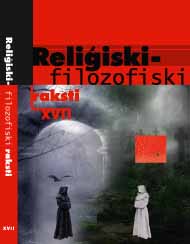Bibliskie motīvi šausmu žanra literatūrā
Biblical Motives in Horror Fiction
Author(s): Bārbala SimsoneSubject(s): Literary Texts
Published by: Latvijas Universitātes Filozofijas un socioloģijas institūts
Summary/Abstract: The present paper „Biblical Motives in Horror Fiction” is devoted to analysis of the influence of the Bible on the genres of popular literature, namely, that of the horror fiction. The horror fiction has long been underrated by literary scholars who tend to view it as a pulp genre; however, in the previous decades serious academic research has been devoted to this particular branch of fiction and a variety of possible interpretations to the horror elements it offers have been found. No serious research, however, has up to now addressed the problem of Biblical motives, themes and allusions that have been extensively used in several branches of horror fiction. The present paper, therefore, first addresses the question of how the writers of horror fiction incorporate the Biblical element in their works and what their reasons for doing so could be. First, the introductory part of the paper offers a general overview of the Bible as one of the primary sources for exploring the supernatural in Western culture that has consequently influenced a variety of literary works, including the modern genre literature and also horror fiction. The first chapter of the paper provides an insight in the ways of interaction between the Bible and the modern horror fiction. Based on the theory of Biblical influences on horror movies by Mary Ann Beavis, this part of the paper distinguishes among three main fields of the Biblical themes and motives that tend to appear most frequently in horror fiction: the Bible and its texts as a weapon in the universal conflict between the forces of good and evil, Bible as the source of prophecies of apocalypse, Bible as a source of information regarding demonic obsession. The second chapter turns to the phenomenon of the so called occult novels of the 1960ies and 1970ies that became intensely popular by employing Biblical themes and motives in contemporary context. Three of these novels are analysed in detail in corresponding subchapters.
Journal: Religiski-filozofiski raksti
- Issue Year: XVII/2014
- Issue No: 1
- Page Range: 9-34
- Page Count: 26
- Language: Latvian

